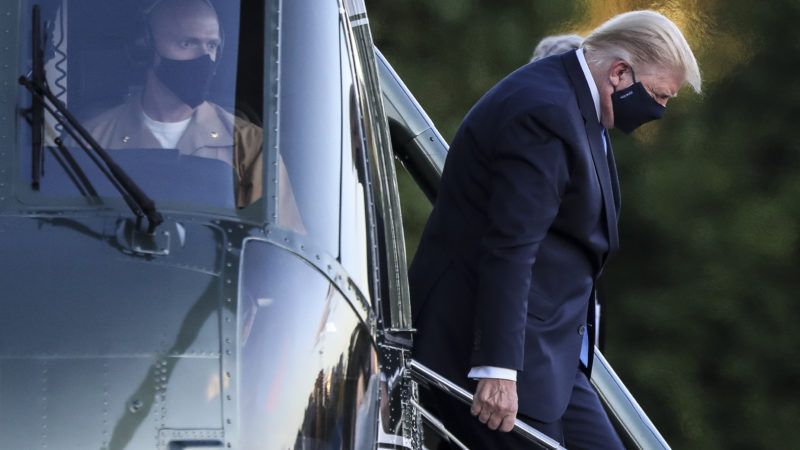Hydroxychloroquine Is Conspicuously Absent from Trump's COVID-19 Treatment Regimen
And that's good.

President Donald Trump has been touting chloroquine and hydroxychloroquine since March as effective treatments for COVID-19. He even took hydroxychloroquine as a prophylactic measure for two weeks in May.
Last week, when the president was hospitalized for a COVID-19 infection, his physicians listed the medications with which he is being treated. Hydroxychloroquine is notable by its absence.
Instead, the president has been aggressively treated with Regeneron Pharmaceuticals' polyclonal antibodies. This combination of two monoclonal antibodies aims to block the coronarvirus from infecting cells, providing extra time for patients' immune systems to ramp up their own natural defenses against the virus. While the treatment is still in clinical trials, preliminary reports suggest that it does substantially help to alleviate COVID-19 symptoms.
The president's team of physicians subsequently started him on a five-day course of remdesivir infusions that aim to inhibit the virus' ability to replicate. Clinical trials suggest that the drug offers moderate benefits by shortening the recovery time for people with COVID-19 from an average of 15 days to about 11 days. That said, in one study "remdesivir did not appear to affect rates of severe acute respiratory syndrome coronavirus 2 viral RNA load decline and mortality when compared with placebo." In other words, the drug did not hasten the elimination of the virus nor have much effect on the death rates of COVID-19 patients.
Now the president is being treated with the corticosteroid drug dexamethasone. Some preliminary research finds that this drug can modestly reduce the risk of mortality for COVID-19 patients who are on ventilators or receiving supplementary oxygen. It had no apparent effect on the risk of death for patients who were not receiving respiratory support. (The president has reportedly been given supplementary oxygen.)
In addition to the these cutting-edge treatments, the president is also taking zinc, vitamin D, famotidine, melatonin, and a daily aspirin.
Given the role that zinc plays in the immune system, some researchers have suggested that the nutritional supplement might help reduce the health consequences for COVID-19 patients, especially among that portion of the population experiencing zinc deficiency. A very preliminary observational study reported in August found that zinc therapy had minimal effect on the survival of hospitalized patients with COVID-19. But another small study, reported in September, found that zinc-deficient COVID-19 patients "developed more complications with prolonged hospital stay and were associated with increased mortality."
Researchers have tentatively concluded based on observational studies that supplementation with vitamin D could help prevent COVID-19 coronavirus infections and ameliorate the symptoms of those who do become infected. An October report of one small randomized controlled study in Spain found that administering a high dose of vitamin D "significantly reduced the need for ICU treatment of patients requiring hospitalization due to proven COVID-19."
Famotidine, widely used to reduce stomach acid, may prevent the immune systems of COVID-19 patients from unleashing an uncontrolled inflammatory response to the virus that ends up destroying their organs. Several observational studies have suggested that administering the compound to hospitalized COVID-19 patients reduces their risk of death. And one small study of non-hospitalized patients found that the drug ameliorated the symptoms of the disease.
Some researchers are speculating that the sleep hormone melatonin might help prevent an overactive and destructive inflammatory response to infection by the coronavirus. No clinical trials researching this hypothesis have been conducted.
You might wonder why the president's doctors aren't treating him with hydroxychloroquine, the compound Trump has been touting as a COVID-19 treatment for months? The answer: lack of evidence from clinical trials that it works.
A July report of a randomized trial in which patients with early diagnoses of COVID-19 were treated with hydroxychloroquine found that the compound "did not substantially reduce symptom severity in outpatients with early, mild COVID-19." An August study reporting the results of a multicenter randomized trial using hydroxychloroquine to treat COVID-19 patients concluded that adding the drug "to standard care did not add significant benefit, did not decrease the need for ventilation, and did not reduce mortality rates in COVID-19 patients." An August 26 systematic meta-analysis of the effect of hydroxychloroquine administered with and without the anti-bacterial azithromycin reported that "hydroxychloroquine alone was not associated with reduced mortality in hospitalized COVID-19 patients but the combination of hydroxychloroquine and azithromycin significantly increased mortality."
It is not surprising that the president's medical team have declined to prescribe hydroxychloroquine as a treatment, since no randomized controlled trials to date have shown any significant benefit to COVID-19 patients with the drug.


Show Comments (149)